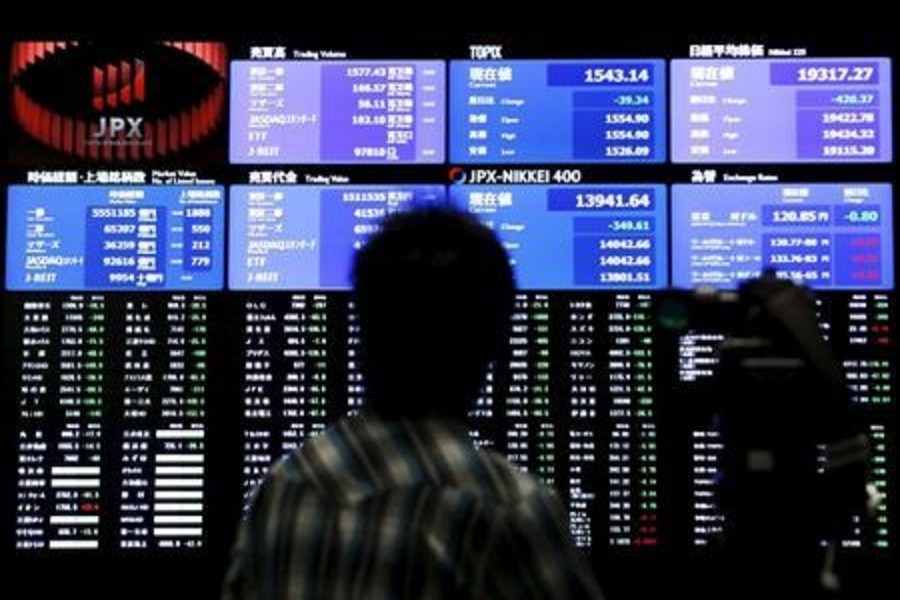Asian shares rallied on Friday as risk appetite got a boost from soft US inflation, helping alleviate worries of faster rate hikes by the Federal Reserve, while investors also cheered US-North Korean steps to further ease tensions on the Korean Peninsula.
Thursday’s slower-than-expected April consumer price rises followed payrolls data last week which pointed to sluggish wage growth.
The two data sets meant “inflation may be rising but not so rapidly that the Fed would have to take aggressive actions to keep the economy from overheating,” said James McGlew, analyst at Perth-based stock broker Argonaut.
The recent shakeout in markets, partly stoked by Sino-US trade tensions, has also eased off, while money managers expect the relatively low global rates that fueled the ‘goldilocks’ boom in stock markets last year will remain in place for some time.
“While inflation is continuing to trend up it’s only happening slowly. So Goldilocks continues,” Shane Oliver, chief investment manager at AMP, said in a note.
Indeed, a key measure of expected market swings, the Cboe Volatility Index, or VIX, has fallen very close to levels last seen in early January when stock markets were buoyant.
MSCI’s broadest index of Asia-Pacific shares outside Japan rose 0.9 per cent to near three-week highs with broad-based gains across all sectors.
Japan’s Nikkei climbed 1 per cent while South Korea’s KOSPI added 0.7 per cent. Hong Kong’s Hang Seng index jumped 1.4 per cent. Chinese shares gave up early gains to be marginally lower.
On Wall Street, the Dow rose 0.8 per cent, the Nasdaq Composite gained 0.89 per cent and the S&P 500 rose 0.9 per cent, surging past key resistance of 2,717 points.
Geopolitics
Investors also appeared to welcome continued moves between the United States and North Korea to reduce tensions in the region.
US President Donald Trump will meet North Korean leader Kim Jong un in Singapore next month amid high hopes of “doing something very meaningful” to curtail Pyongyang’s nuclear ambitions.
Concerns still remain around US-China trade skirmishes and rising tensions in the Middle East, although analysts say the June 12 US-Korea summit will ensure the trade war rhetoric takes a back-seat for now.
“Trump still needs President Xi (Jinping) and China’s support in dealing with North Korea and this will be his priority in the short term,” economists at JPMorgan wrote in a note to clients.
“Once the meeting is finished, trade may return to the fore.”
The United States and China locked horns over import tariffs earlier this year after Trump first announced hefty duties on Chinese goods, provoking a tit-for-tat response from Beijing.
“It is notable that in line with this view, the US has extended hearings over China tariffs, drawing out the process,” they added.
Currency markets were largely muted during Asian trading.
The dollar index was up 0.1 per cent after falling the most since late March in overnight trade.
Investors trimmed their expectations for four Fed rate hikes after inflation data showed US price pressures remained weak. The Fed has already raised rates once this year and is widely expected to go two more times in 2018.
The British pound inched above a four-month low of $1.3457 touched on Thursday after the BoE held key borrowing costs. It was last at $1.3525.
The recent slowing in price growth in major economies has boosted expectations that most central banks except the Fed will continue their massive bond-buying programs to keep policy stimulatory.
The euro was barely changed at $1.1911. The Japanese yen was a tad weaker at 109.45 per dollar.
Malaysian markets were closed Friday but its newly appointed Prime Minister Mahathir Mohamad emerged with key election pledges including repealing an unpopular goods and services tax and restoring a petrol subsidy.
Ratings agency Moody’s said some campaign promises would be “credit negative” for Malaysia.
Such concerns pushed up the cost of insuring against a Malaysia default, with the country’s 5-year credit default swap price at its highest since early June 2017 at 95.090 basis points.
In commodities markets, spot gold slipped 0.1 per cent to $1,319.33 an ounce.
According to Reuters, oil prices eased but stayed near multi-year peaks amid supply concerns after Trump withdrew from an Iranian nuclear deal and reinstated sanctions.
US crude futures were last down 10 cents at $71.26 a barrel. Brent crude futures fell 18 cents to $77.29 a barrel, after hitting $78 earlier in the day, their highest since November 2014.


